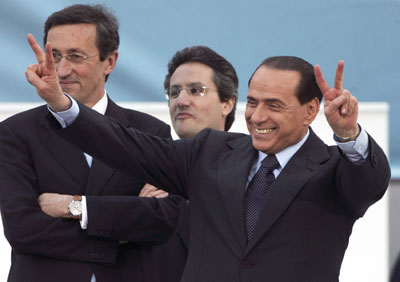After five years, are Italians so tired of Silvio Berlusconi that they will
toss him out?
Many political analysts say the election being held Sunday and Monday will
essentially be a verdict on the prime minister, who has swaggered across the
stage but left the economy limping.

Italian Prime Minister
Silvio Berlusconi reacts during the final electoral rally of the center
right coalition in Naples, Italy April 7, 2006. Italy will go to a
national vote on April 9-10. [Reuters] |
But his challenger at the top of a center-left coalition, Romano Prodi, has
also failed to inspire great confidence, these analysts say, amid doubts that
his multiparty coalition will be able to stick together long enough to improve
Italy's lagging economy. However they vote, Italians do not seem to be mustering
hope of real improvement in Italian life.
"There's the real perception that Italians despair of having a future," said
Lucio Caracciolo, editor in chief of Limes, a political review whose most recent
issue, published Friday, focused on the country's bleak self-perception.
"There is the sensation that our destiny is slipping from our grasp and there
is little we can do to change it," he said. "If this is the depressed mood of
the country, then its prospects aren't encouraging."
There were large elections rallies on the last day of campaigning Friday, and
last-gasp pleas and promises to a disheartened electorate that is being asked to
choose between two diffuse coalitions, each composed of parties that do not
fully agree on political programs and policies.
Speaking in Naples, Berlusconi, who was flanked by his chief allies, played
the tax card: "Do you want to leave the future of your children in the hands of
those who want to put odious taxes on your homes, your savings and what you want
to leave your children?" he asked, referring to his opponents as having "Lenin,
Stalin,
Mao and Pol Pot as idols." He exhorted his supporters to vote and "choose to
not go backwards, to move forward for freedom."
In Rome, Prodi, said his center-left coalition offered only one promise: "to
win the elections and govern for the good of Italy." A vote for his camp, whose
leaders were present on the stage set up in the Piazza del Popolo, he said,
would be "a call for the reconstruction of the country."
When the last official polls were published two weeks ago, Prodi held the
lead by a slight margin. Since then, in a rancourous end to the campaign, both
leaders have scrambled to lure undecided votes.
In a dizzying display of bravado, Berlusconi has used the waning days of the
campaign for a whirlwind succession of dramatic revelations (judicial plots
against him, thwarted terrorist attacks) and made a rapid succession of
electoral promises (tax cuts on bank current accounts, abolition of a municipal
real estate tax, higher pensions).
A front-page editorial Friday in Corriere della Sera, Italy's leading paper,
openly questioned where the center- right thought it would find the money to
finance its entire electoral program, estimated to cost between ?6 billion, or
$44 billion, and ?01 billion a year.
Prodi, a one-time prime minister and former president of the European
Commission, has taken a more low-key line of attack, campaigning to restore
unity in a country deeply divided over his colorful rival.
Prodi has promised to cut the costs of labor for businesses by 5 percent, but
he has had to defend the center left against charges that it intends to raise
old taxes and introduce new ones to finance Italy's recovery.
But Prodi's coalition spans the center to far left and many Italians doubt it
would be able to govern effectively.
"If they win with a small margin, it will be difficult to pass the tough laws
that are necessary to push through real reforms and fix the disasters that the
Berlusconi government passed," said Grazia Di Franco, an interior decorator in
Rome, who supports the center left.
An electoral law passed by the center-right majority last year reintroduced a
proportional system that favors individual parties.
That means that no matter who wins, victory is unlikely to come with a
substantial majority, meaning that the winner could be unable to rule with a
firm hand.
If the new government is forced to tread lightly to stay in power and has to
satisfy a diverse coalition, it will be all the harder to act decisively on
Italy's bleak economic outlook - near zero growth, declining competitiveness
against low-cost manufacturers like China and growing public debt.
Pollsters disagree about the number of undecided voters. Polls have estimated
them at 15 percent.
"In the end, the undecided are almost evenly split between the left and the
right," said Piergiorgio Corbetta, a director of research at the Istituto
Cattaneo, a research group in Bologna.
Both sides have been appealing to Roman Catholics, who make up the lion's
share of the country's 50 million voters. But they, too, are divided.
Aurelio Mottola, editor of a Catholic publishing house, said, "Some Catholic
ideals, like the notion of social justice, is very much present in some parties
of the center-left coalition." But "the parties of the right support family
values, and are hostile to proposals like same-sex unions."